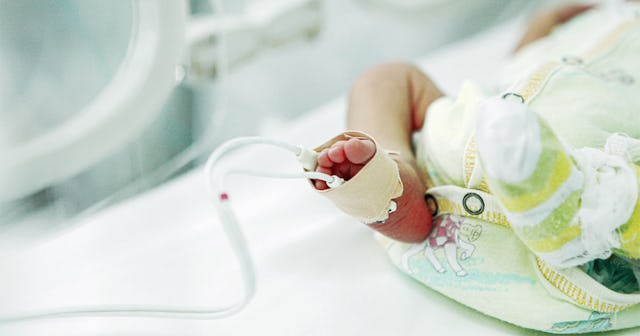Baby Boys Could Face Higher Risks From COVID Even Before Birth

The impacts on babies, particularly baby boys, are concerning to experts
The COVID-19 pandemic has hit certain groups harder than others, including pregnant people. In addition to the effects on pregnant people themselves, it turns out the impacts on their children can be severe and long-term, particularly in baby boys.
In addition to the stress a pandemic has brought on pregnant moms, they are five times as likely to require intensive care than non-pregnant women if they contract COVID and 22 times as likely to die. But the effects on their children are equally as concerning. According to the Lancet, babies born to COVID-infected moms are 60% more likely to be born prematurely. This increases their chances of infant mortality and long-term disabilities like cerebral palsy, asthma, hearing loss and feeding issues, and an increased risk of SIDS.
Unfortunately, some of the other problems caused may not show up for years. “Some of these conditions do not show up until middle childhood or early adult life, but they have their origins in fetal life,” Dr. Evdokia Anagnostou, a neurologist and pediatrics professor at the University of Toronto, told NBC News. This includes depression, anxiety, heart, and kidney disease caused by continuous exposure to harmful inflammation in-utero when the mom’s immune system is fighting a virus, or there is a constant state of stress.
According to the CDC, only around 35% of pregnant women are vaccinated, a stunning statistic given the risks involved with remaining unvaccinated. “People who are pregnant or recently pregnant are more likely to get severely ill with COVID-19 compared with people who are not pregnant,” the agency said. “COVID-19 vaccination is recommended for people who are pregnant, breastfeeding, trying to get pregnant now, or might become pregnant in the future.”
At least 150,000 pregnant people have been diagnosed with COVID, and more than 25,000 of them have been hospitalized, the agency reported.
For boys, the statistics could be even direr. Sabra Klein, a professor of molecular microbiology and immunology at the Johns Hopkins Bloomberg School of Public Health, told NBC that males are generally “more vulnerable” than females as fetuses and are more likely to be born prematurely, and have a higher risk of disability and death. But COVID poses additional risks to boys because they are affected at a higher rate than females for conditions linked to maternal infections. Edlow said her findings raise questions about the “cross talk” between mother and baby. “The mom’s immune system is sensing there is a male fetus,” Dr. Andrea Edlow, senior author of the study and a maternal-fetal medicine specialist at Massachusetts General Hospital, added. “And the fetus is actively communicating with the mom’s immune system.”
The CDC and other health agencies have continued to let pregnant people know about the risks of developing COVID while pregnant and that the vaccine is safe to get while pregnant. The vaccine could not only save the mom’s life but could protect their babies, now and in the future.